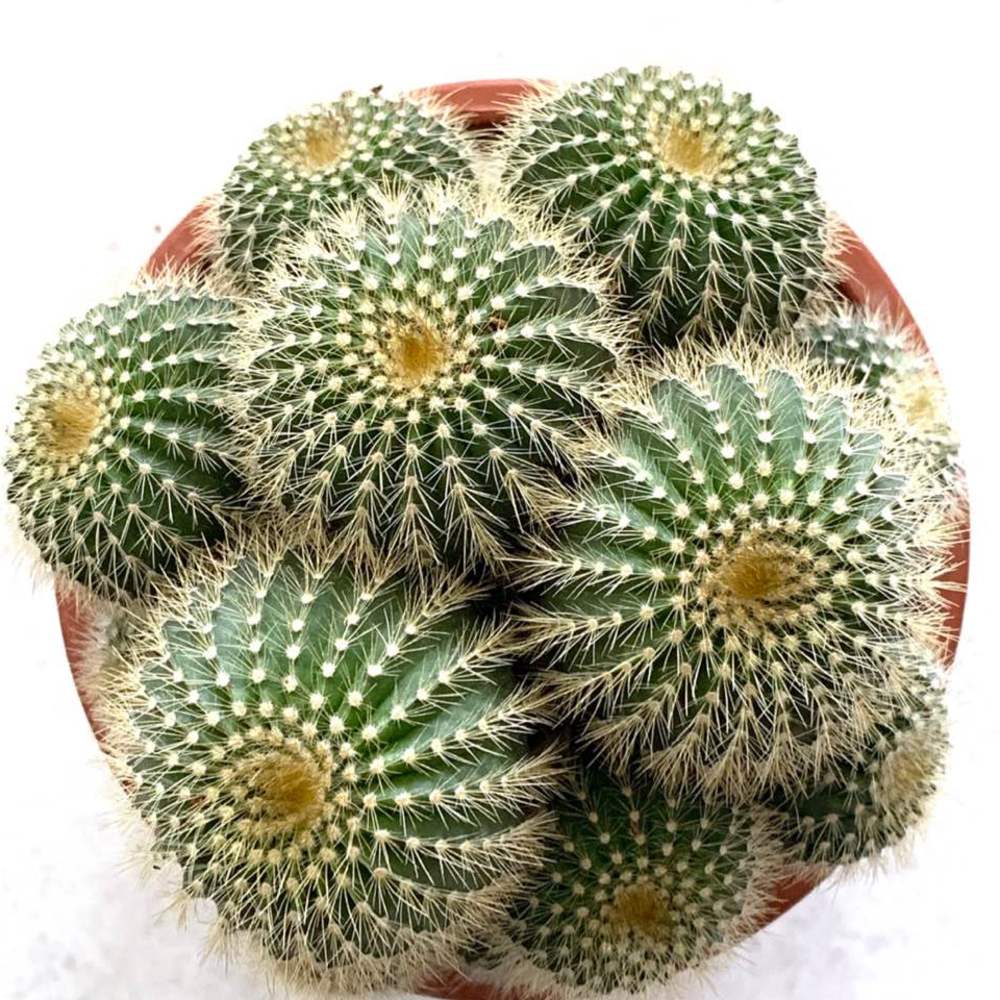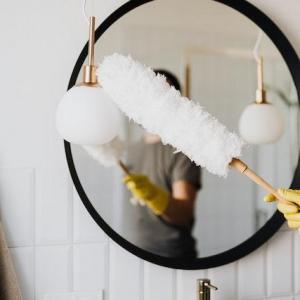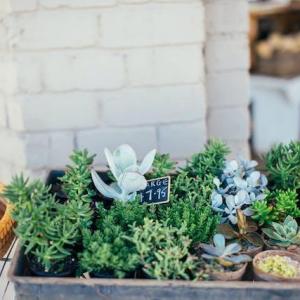Plant Experience
Detail
Parodia leninghausii is appreciated because of the long harmless golden spines. The young plants are globular, then columnar up to 3.3 feet (1 m) tall, up to 5 inches (12 cm) in diameter and about 30 ribs. Old plants cluster from the base. Flowers are yellow, up to 2 inches (5 cm) in diameter, at the top of the plants, but only if adult (at least 8 inches/20 cm tall).
How to Grow and Care
If you can grow cacti and succulents successfully, you can likely grow the popular Parodia without too much trouble. It's key to remember, however, that Parodia don't like direct sunlight and are accustomed to more even water than many other cacti species. It's imperative that the cactus is not exposed to prolonged dampness and sitting water. Never let your cactus sit in a dish of water. To encourage better flowering, allow the plants to enjoy a cooling period in the winter and dramatically cut back watering. Unlike other cacti species, however, you don't need to entirely stop watering. Lastly, make sure to fertilizer during the growing season for the best results.
Repot as needed, preferably during the warm season. To repot a cacti, make sure the soil is dry before repotting, then gently remove the pot. Knock away the old soil from the roots, making sure to remove any rotted or dead roots in the process. Treat any cuts with a fungicide. Place the plant in its new pot and backfill with potting soil, spreading the roots out as you repot.
Growing Conditions
Light: Parodia typically don't like direct afternoon sunlight and should be in partial shade through the hottest hours. They can take direct sunlight in the morning and afternoons.
Water: Throughout the growing season (spring and summer) provide regular water to keep the potting soil lightly moist. In the winter, cut back watering and let the soil almost dry between waterings, but do not let it completely dry out.
Soil: A rich, fast-draining cactus mix is ideal.
Fertilizer: During the growing season, fertilize with a cacti fertilizer mix. These respond especially well to fertilizer. Suspend feeding during the dormant winter period.
Propagation
Parodia cacti can be propagated easily from offsets, which readily form in clusters around the base of the mother plant. To propagate, carefully remove the offset and allow the cut section to dry on a paper towel for a few days. Depending on the size of the cut area, a callous will form over the cut surface. Once the callous has formed, place the new plant in a pot with a potting soil mixture and keep in a warm place until new roots emerge. Once the plant is established, repot it into a regular container. Parodia are also relatively easy to grow from seeds. Once the sprouts have emerged, keep them regularly moist for the few months and be prepared to wait: some of the more common Parodia species can take a long time to grow to a decent size.
Repotting
Repot as needed, preferably during the warm season. To repot a cacti, make sure the soil is dry before repotting, then gently remove the pot. Knock away the old soil from the roots, making sure to remove any rotted or dead roots in the process. Treat any cuts with a fungicide. Place the plant in its new pot and backfill with potting soil, spreading the roots out as you repot. Leave the plant dry for a week or so, then begin to water lightly to reduce the risk of root rot.
How to Grow and Care
If you can grow cacti and succulents successfully, you can likely grow the popular Parodia without too much trouble. It's key to remember, however, that Parodia don't like direct sunlight and are accustomed to more even water than many other cacti species. It's imperative that the cactus is not exposed to prolonged dampness and sitting water. Never let your cactus sit in a dish of water. To encourage better flowering, allow the plants to enjoy a cooling period in the winter and dramatically cut back watering. Unlike other cacti species, however, you don't need to entirely stop watering. Lastly, make sure to fertilizer during the growing season for the best results.
Repot as needed, preferably during the warm season. To repot a cacti, make sure the soil is dry before repotting, then gently remove the pot. Knock away the old soil from the roots, making sure to remove any rotted or dead roots in the process. Treat any cuts with a fungicide. Place the plant in its new pot and backfill with potting soil, spreading the roots out as you repot.
Growing Conditions
Light: Parodia typically don't like direct afternoon sunlight and should be in partial shade through the hottest hours. They can take direct sunlight in the morning and afternoons.
Water: Throughout the growing season (spring and summer) provide regular water to keep the potting soil lightly moist. In the winter, cut back watering and let the soil almost dry between waterings, but do not let it completely dry out.
Soil: A rich, fast-draining cactus mix is ideal.
Fertilizer: During the growing season, fertilize with a cacti fertilizer mix. These respond especially well to fertilizer. Suspend feeding during the dormant winter period.
Propagation
Parodia cacti can be propagated easily from offsets, which readily form in clusters around the base of the mother plant. To propagate, carefully remove the offset and allow the cut section to dry on a paper towel for a few days. Depending on the size of the cut area, a callous will form over the cut surface. Once the callous has formed, place the new plant in a pot with a potting soil mixture and keep in a warm place until new roots emerge. Once the plant is established, repot it into a regular container. Parodia are also relatively easy to grow from seeds. Once the sprouts have emerged, keep them regularly moist for the few months and be prepared to wait: some of the more common Parodia species can take a long time to grow to a decent size.
Repotting
Repot as needed, preferably during the warm season. To repot a cacti, make sure the soil is dry before repotting, then gently remove the pot. Knock away the old soil from the roots, making sure to remove any rotted or dead roots in the process. Treat any cuts with a fungicide. Place the plant in its new pot and backfill with potting soil, spreading the roots out as you repot. Leave the plant dry for a week or so, then begin to water lightly to reduce the risk of root rot.
Album (5)

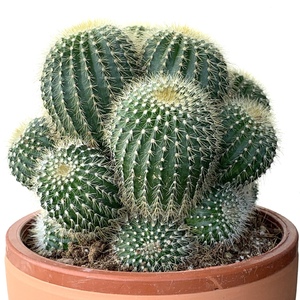
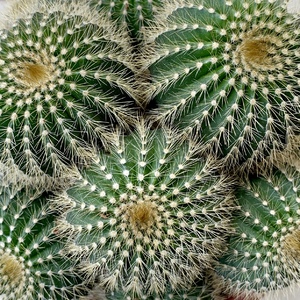
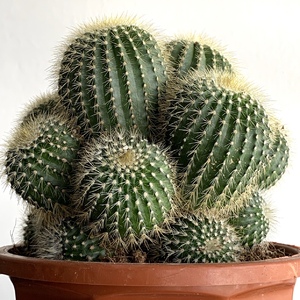
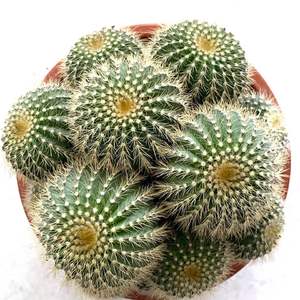
kensong
2019-06-12

This is my first growing diary. From C&O RM50.










Elite Article


